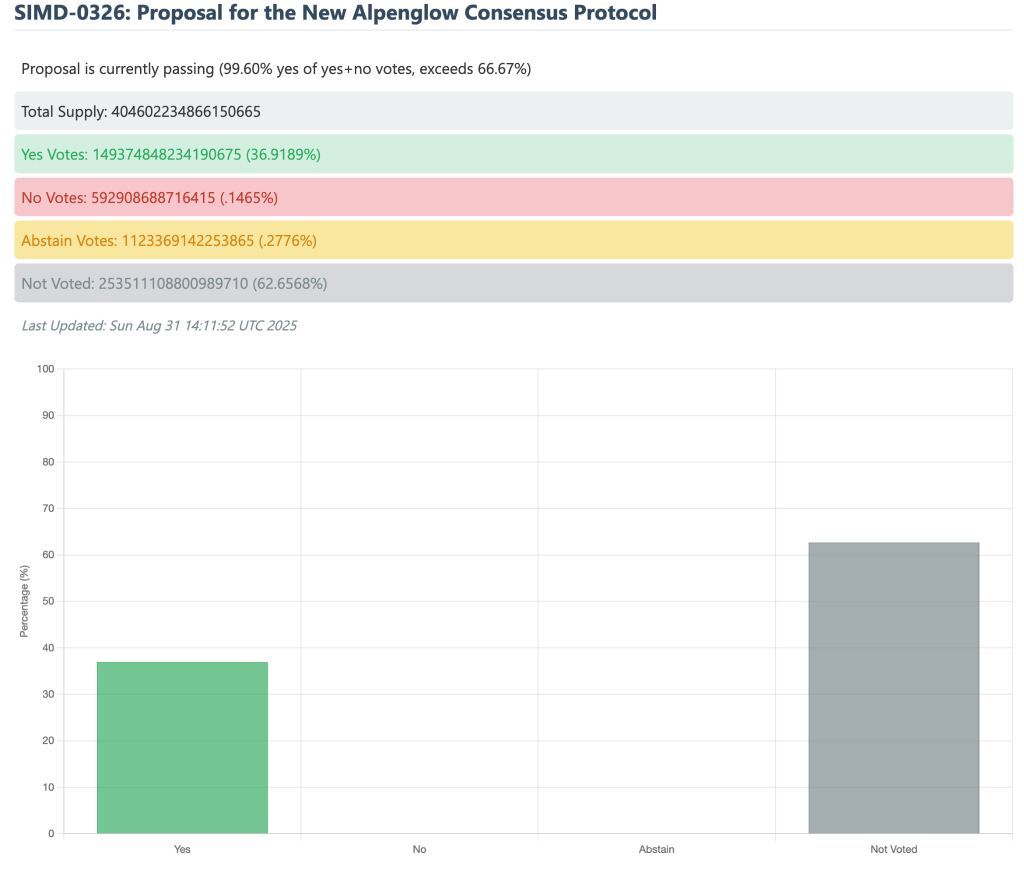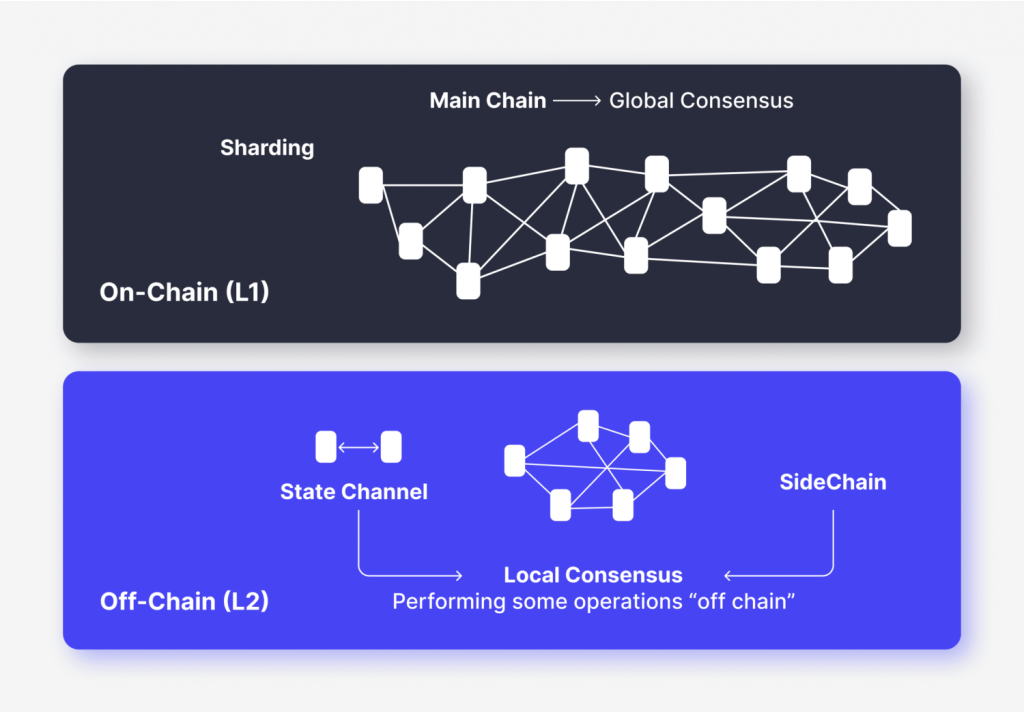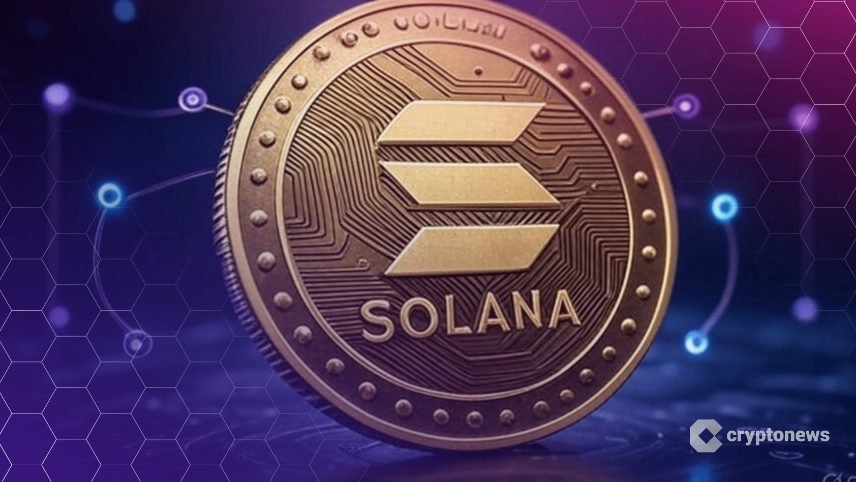Solana validators overwhelmingly support the SIMD-0326 Alpenglow consensus upgrade with 99.60% approval.
The revolutionary consensus mechanism would replace TowerBFT with a direct voting system, reducing block finality from 12.8 seconds to as low as 100-150 milliseconds while achieving Web2-level performance.

Validators Rally Behind Historic Consensus Transformation
Voting began on August 27 across epochs 840-842, with 149.3 million SOL voting in favor compared to just 592,000 SOL opposing the proposal.
Current participation stands at 36.9% of the total supply, with 459 validators casting ballots across stake levels, ranging from small operators to major liquid staking protocols.
The Alpenglow upgrade introduces Votor, a lightweight voting protocol that eliminates on-chain vote transactions through cryptographic signature aggregation.
Validators would exchange votes directly using a “20+20” resilience model, allowing the network to operate even with 20% adversarial nodes and an additional 20% of unresponsive nodes.
Major staking providers, including Jito, Marinade, and Blaze, recorded strong yes votes, while individual validators across stake ranges from 100,000 SOL to over 1 million SOL support the transition.
The proposal requires two-thirds majority approval with a 33% quorum threshold, including abstentions.
Revolutionary Architecture Targets Sub-Second Block Finality
Alpenglow represents a fundamental departure from Solana’s Proof-of-History and TowerBFT mechanisms, addressing performance limitations that impose long finality delays without formal safety guarantees.
The new architecture operates through discrete time slots with randomized, verifiable leader selection managing consecutive windows.
Leaders collect transactions into blocks, split them into intermediate slices and smaller shreds, and initially distribute them via the existing Turbine protocol.
Future updates will replace the Turbine with a more efficient Rotor system, which will require separate SIMD approval for enhanced bandwidth optimization.
Moreover, off-chain voting eliminates current on-chain vote transaction requirements, removing significant bandwidth overhead, transaction fees, and processing costs.

Validators cast exactly one vote per slot, with conflicting votes being detectable and participation failures resulting in reward exclusion.
The Validator Admission Ticket mechanism requires a 1.6 SOL payment per epoch for participation, with fees burned to offset inflation.
The upfront cost replaces direct voting transaction fees, representing 80% of existing on-chain voting expenses.
Technically, the protocol aims to achieve consensus latency that matches Web2 performance standards while strengthening the security posture with new techniques.
Governance Evolution Drives Validator Consensus Amid Technical Concerns
While the voting is going smoothly, the community debate centers on the economic implications and implementation strategy.
While some validators expressed strong support for simplifications, which could save months of addressing TowerBFT edge cases, others were more cautious.
As a result, they suggest alternative VAT models which include pro-rata distribution based on active stake or tiered fees ranging from 0.5 to 5 SOL per epoch.
Primarily, technical concerns focus on transaction expiration policies without Proof-of-History, validator performance tracking through off-chain voting, and the lack of detailed testing and deployment plans.
Speaking with Cryptonews, Shawn Young, Chief Analyst at MEXC Research, emphasized the strategic significance of the upgrade.
“The potential 100X speed improvement could redefine layer-1 blockchain performance, making Solana attractive for high-frequency applications, payments, and large-scale decentralized finance infrastructure,” Young noted.
Young highlighted the growing institutional backing, with over $1.7 billion locked in corporate treasuries, and potential SOL ETF approvals creating structural demand.
As a result, he projects that SOL could reach $215 by the end of September and $250 by the end of Q4, provided successful implementation without technical disruptions.
The upgrade follows previous governance evolution, including the rejected SIMD-0228 dynamic inflation proposal, which failed to receive supermajority approval despite initial institutional support.
Current voting mechanics utilize an adapted Jito Merkle Distributor tool to collect stake weights and distribute tokens across ‘Yes’, ‘No’, and ‘Abstain’ addresses.
Participation patterns reveal broad validator support across stake levels, with smaller validators showing similar approval rates to major institutional operators.
Raoul Pal’s prediction, reported today, of 4 billion crypto users by 2030 provides a broader context for infrastructure upgrades like Alpenglow.
The former hedge fund manager forecasts that the crypto market capitalization will surpass $100 trillion by 2032, driven by the need for scalable blockchain performance to support debasement and adoption.
However, critics question the reliability of his wallet-based user metrics, noting that single users often maintain multiple addresses.
Nonetheless, the successful implementation of the Alpenglow consensus upgrade could trigger other blockchains to also optimize for performance and scalability, thereby supporting billions of users through sub-second transaction finality and reduced operational costs.
The post 99% Back Solana’s Alpenglow Upgrade to Slash Transaction Finality to 150ms appeared first on Cryptonews.
This articles is written by : Nermeen Nabil Khear Abdelmalak
All rights reserved to : USAGOLDMIES . www.usagoldmines.com
You can Enjoy surfing our website categories and read more content in many fields you may like .
Why USAGoldMines ?
USAGoldMines is a comprehensive website offering the latest in financial, crypto, and technical news. With specialized sections for each category, it provides readers with up-to-date market insights, investment trends, and technological advancements, making it a valuable resource for investors and enthusiasts in the fast-paced financial world.

 BREAKING: The
BREAKING: The